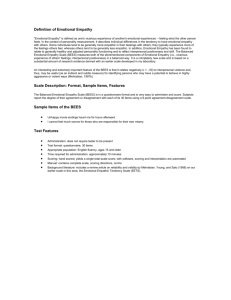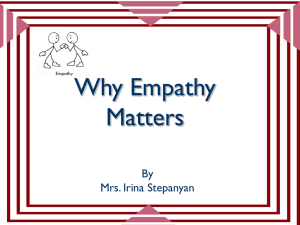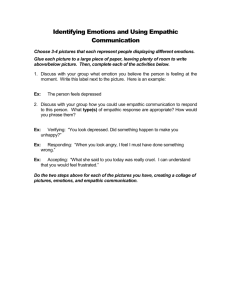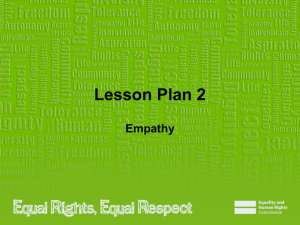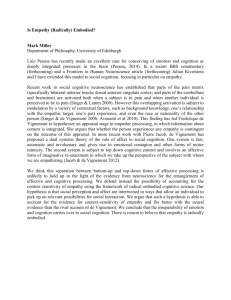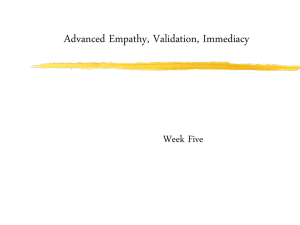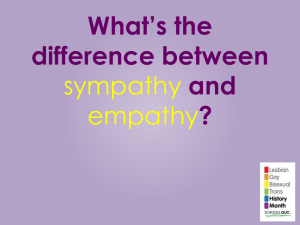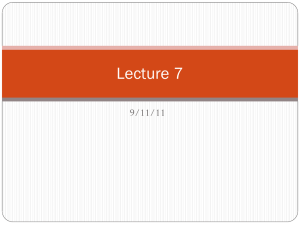Psychiatry`s Global Challenge
advertisement
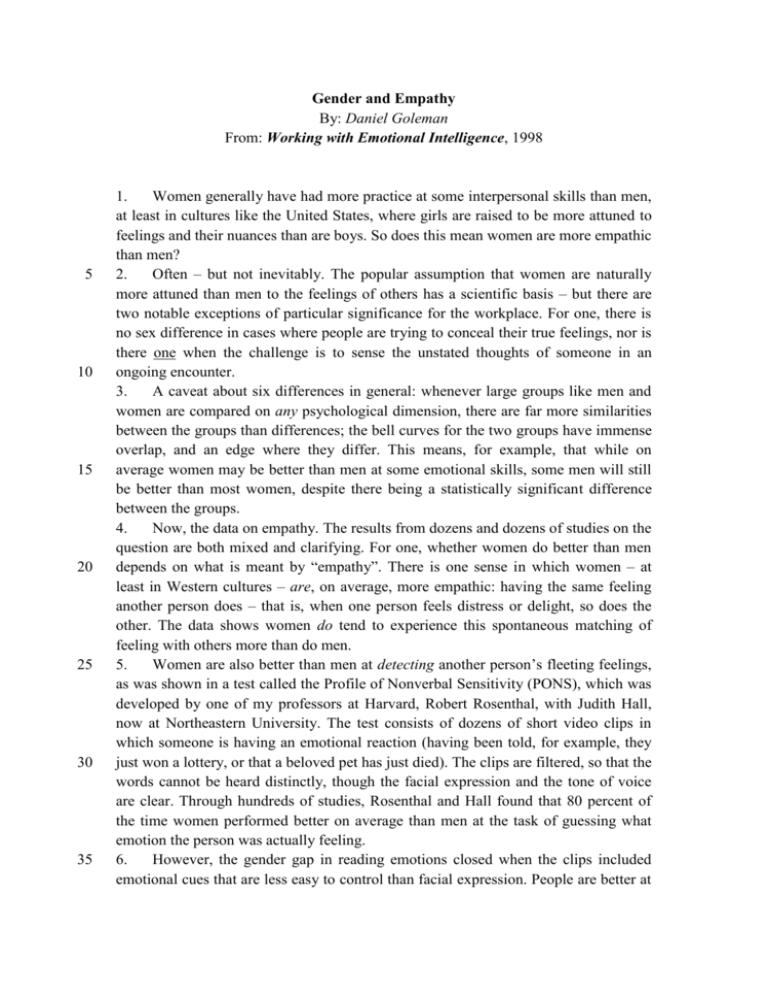
Gender and Empathy By: Daniel Goleman From: Working with Emotional Intelligence, 1998 5 10 15 20 25 30 35 1. Women generally have had more practice at some interpersonal skills than men, at least in cultures like the United States, where girls are raised to be more attuned to feelings and their nuances than are boys. So does this mean women are more empathic than men? 2. Often – but not inevitably. The popular assumption that women are naturally more attuned than men to the feelings of others has a scientific basis – but there are two notable exceptions of particular significance for the workplace. For one, there is no sex difference in cases where people are trying to conceal their true feelings, nor is there one when the challenge is to sense the unstated thoughts of someone in an ongoing encounter. 3. A caveat about six differences in general: whenever large groups like men and women are compared on any psychological dimension, there are far more similarities between the groups than differences; the bell curves for the two groups have immense overlap, and an edge where they differ. This means, for example, that while on average women may be better than men at some emotional skills, some men will still be better than most women, despite there being a statistically significant difference between the groups. 4. Now, the data on empathy. The results from dozens and dozens of studies on the question are both mixed and clarifying. For one, whether women do better than men depends on what is meant by “empathy”. There is one sense in which women – at least in Western cultures – are, on average, more empathic: having the same feeling another person does – that is, when one person feels distress or delight, so does the other. The data shows women do tend to experience this spontaneous matching of feeling with others more than do men. 5. Women are also better than men at detecting another person’s fleeting feelings, as was shown in a test called the Profile of Nonverbal Sensitivity (PONS), which was developed by one of my professors at Harvard, Robert Rosenthal, with Judith Hall, now at Northeastern University. The test consists of dozens of short video clips in which someone is having an emotional reaction (having been told, for example, they just won a lottery, or that a beloved pet has just died). The clips are filtered, so that the words cannot be heard distinctly, though the facial expression and the tone of voice are clear. Through hundreds of studies, Rosenthal and Hall found that 80 percent of the time women performed better on average than men at the task of guessing what emotion the person was actually feeling. 6. However, the gender gap in reading emotions closed when the clips included emotional cues that are less easy to control than facial expression. People are better at Gender and Empathy / 2 40 45 50 55 60 65 controlling their overall facial expression than their tone of voice, body language, or fleeting “microemotions” that flit across the face for just a split second. The more emotional leakage, the better men become at reading emotion in others. Being able to pick up such emotional leakage is particularly important in situations where people have reason to conceal their true feelings – a fact of life in the business arena. And so sex differences in empathy tend to disappear in many everyday business situations, like sales or negotiation, where most people simply cannot control all the body’s channels for expressing emotion. 7. And when it comes to another dimension of empathy – being able to sense someone’s specific thoughts – there appears to be no sex difference at all. This more complicated task, called empathic accuracy, integrates cognitive and affective skills. The experimental methods used to assess empathic accuracy go beyond showing a snippet of an emotional response and asking people to guess the emotion; rather, subjects watch an entire videotape of a conversation and evaluate a person’s hidden thoughts – as well as feelings – throughout. Those guesses are then compared with the target person’s own narrative. On this task women generally did no better than men in a series of seven different experiments – there was no evidence of a “female intuition” advantage. The significant exception was in a special subset of tests in which women were subtly prompted to prove themselves empathic by the researcher’s suggestion that empathy is a hallmark of feminine identity. With that prompt, the female advantage in empathy emerged once again. In other words, the motivation to seem empathic made women more so (presumably because they made more effort). 8. Indeed, a major review of data on male-female sex differences argues that men have as much latent ability for empathy, but less motivation to be empathic, than do women. To the extent men tend to see themselves in terms of something like machismo, the argument goes, they have less motivation to seem sensitive, because that could be seen as a sign of “weakness.” As William Ickes, one of the main researchers on empathy, puts it, “If men appear at times to be socially insensitive, it may have more to do with the image they wish to convey than with the empathic ability they possess.” Gender and Empathy / 3 Answer the questions below in your own words in English unless otherwise stated. 1. 2. 3. 4. 5. What reason is given in paragraph 1 for the fact that in western societies women have better interpersonal skills than men? Answer: _________________________________________________________ ________________________________________________________________ ________________________________________________________________ Paragraph 2: True or False The writer is convinced that even in the workplace women are more empathic than men. TRUE FALSE Justify your answer by giving two pieces of evidence from the text. a) ______________________________________________________________ ________________________________________________________________ b) ______________________________________________________________ ________________________________________________________________ What does one in line 9 refer to? Answer: _________________________________________________________ Paragraph 3: True or False When making psychological comparisons on groups of men and women, it has been found that there are more differences than similarities. TRUE FALSE Justify your answer according to the text: ____________________________ ________________________________________________________________ ________________________________________________________________ Paragraphs 4 – 7: Fill in results of research data Ability/situation Women Men No difference More ability to feel same emotion as another person Better at guessing the emotion another person feels according to facial expression and tone of voice Better at reading emotions in everyday business situations where people try to hide real feelings More empathetic accuracy when viewing an entire conversation Gender and Empathy / 4 6. 7. 8. 9. 10. Paragraph 7: How does the author define “empathic accuracy”? Answer: _________________________________________________________ ________________________________________________________________ ________________________________________________________________ ________________________________________________________________ “this task” on line 52 refers to _______________________________________ ________________________________________________________________ Complete the CAUSE and EFFECT statement according to paragraph 7” CAUSE: More motivation to seem empathic. EFFECT: ________________________________________________________ ________________________________________________________________ Paragraph 8: How does the author account for the fact that men may have less motivation to seem sensitive? Answer: _________________________________________________________ ________________________________________________________________ ________________________________________________________________ ________________________________________________________________ Paragraph 1 asks a question. According to the entire article, what is the answer to this question? Answer: _________________________________________________________ ________________________________________________________________ ________________________________________________________________ ________________________________________________________________ ________________________________________________________________ ________________________________________________________________
